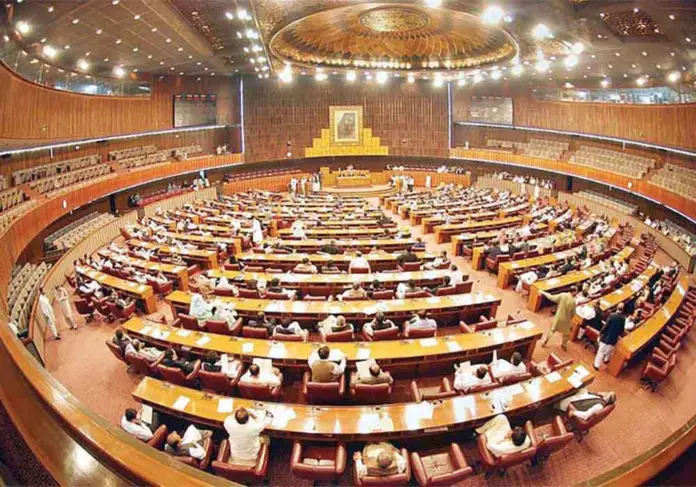The legislators of various political parties on Tuesday introduced the ‘Equal Scales of Salary and Allowances Bill, 2023’ in the National Assembly (NA) in a bid to remove discrimination, exploitative and inconsistent pay packages in the government organizations.
It was a joint bill of Kishwer Zehra of Muttahida Qaumi Movement (MQM), Aliya Kamran of Jamiat Ulema-e-Islam-Fazl, Qadir Khan Mandokhel of Pakistan People’s Party, Tahira Aurangzeb of Pakistan Muslim League-Nawaz, Muhammad Abubakar of MQM, Nawab Sher of Pakistan Tehreek-e-Insaf and Salahuddin of MQM. Introducing the bill on the floor of the house, Kishwer Zehra said it would help provide for uniform and equal scales of salary, allowances and compensations to the employees of various organizations including autonomous, semi-autonomous and statutory bodies, corporations, companies, authorities and other organizations or entities under the administrative control, directly or indirectly, or having share, capitals, of the ministries and divisions of the federal government and ancillary matters.
She was of the view that the bill would remove discrimination and provide equal pay to the employees of equal grades of various organizations working in the ambit of federal government. Qadir Khan Mandokhel said there was huge discrimination among employees who were rendering their services in various departments of the federal government in the same grades but they were being paid differently. He said some of the employees were given a handsome package with extra perks and privileges while the others were deprived of the same financial facilities. He said this discriminatory practice should be stopped particularly in those organizations which were working in the domain of the federal government.
The National Assembly on Tuesday passed two private member bills including the Criminal Laws (Amendment) Bill, 2020 and the Legal Practitioners and Bar Councils (Amendment) Bill, 2021 as reported by the standing committees. The bills were piloted by Moulana Abdul Akbar Chitrali and Dr Nafisa Shah in the House respectively. The statement of objects and reasons of the Criminal Laws (Amendment) Bill, 2020 says that a few people are involved in blasphemy on the internet and social media etc, and they upload such pages and messages covertly.
However, due to Capital Punishment in section 298c, the ratio of people involved in blasphemy of the Holy Prophet (PBUH) is very low. The fact may be observed that disrespecting the Companion of the Holy Prophet (PBUH) and other sacred personalities not only promotes terrorism and disruption in the country but also hurts people from all walks of life. In section 298-A of the Pakistan Penal Code, the punishment against the person who disrespects the wives, family and Companions of the Holy Prophet (PBUH), is imprisonment for a minimum of three years period along with a nominal penalty while this is a bailable crime.
Due to this simple punishment, the criminals, despite, the punishment, commit the same crime again. Hence, due to such simple punishment, the people try on their own to punish the criminal which increases the violence. It is the responsibility of Parliament to review all factors by which terrorist activities promote and prosper within Pakistan by comprehending this matter with sensitivity and seriousness. Moreover, some crimes mentioned in the list of crimes are very lesser in nature than disrespect of Ummahat-ul-Momineen, Ahle-Bait, Khulfa-e-Rashideen and Sahaba-e-Kiram but their punishments are more than that mentioned in section 295-A of Pakistan Panel Code.
The Punishment under section 381 of PPC is imprisonment for ten years and a minor punishment has been provided for those who defame Ummahat-ul-Momineen, Ahle-Bait, Khulfa-e-Rashideen and Sahaba-e-Kiram as compared to that provided in section 298-A of PPC. The statement of object and reasons of the bill moved by Dr Nafeesa Shah says that the Provincial Bar Councils are statutory organizations, responsible for safeguarding the rights, interests and privileges of practising lawyers, regulating their conduct and helping in the administration of justice. The bill intends to increase the number of members of the Sindh Bar Council, from Khairpur District from 1 to 2.
BISP plays key role in disbursement of PM Package for flood affected people: Shazia Marri. Minister for Poverty Alleviation and Social Safety Shazia Marri on Wednesday informed the National Assembly that Benazir Income Support Programme (BISP) played a key role in the disbursement of the Prime Minister Package worth of Rs 70 billion for the flood-affected people across the country. Speaking in the House, she said that around 33 million people were affected due to the devastating flood in the country but the government paid special attention to providing prompt relief to the affectees. She said the government sensitized the entire world within two months about the disaster brought by the torrential rains and flood last year in most parts of the country.







